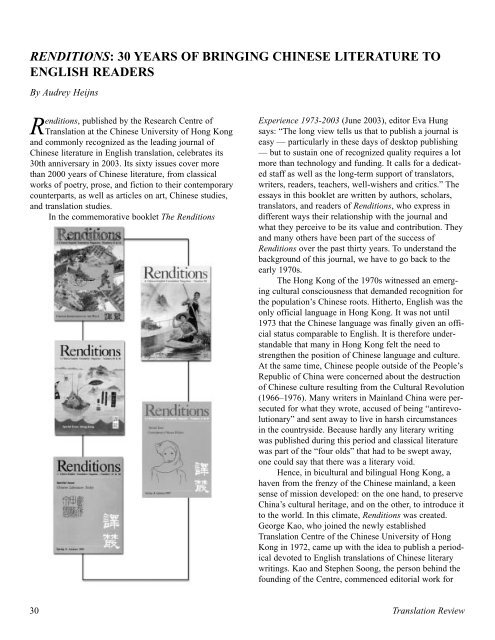Translation Review - The University of Texas at Dallas
Translation Review - The University of Texas at Dallas
Translation Review - The University of Texas at Dallas
- No tags were found...
You also want an ePaper? Increase the reach of your titles
YUMPU automatically turns print PDFs into web optimized ePapers that Google loves.
RENDITIONS: 30 YEARS OF BRINGING CHINESE LITERATURE TOENGLISH READERSBy Audrey HeijnsRenditions, published by the Research Centre <strong>of</strong><strong>Transl<strong>at</strong>ion</strong> <strong>at</strong> the Chinese <strong>University</strong> <strong>of</strong> Hong Kongand commonly recognized as the leading journal <strong>of</strong>Chinese liter<strong>at</strong>ure in English transl<strong>at</strong>ion, celebr<strong>at</strong>es its30th anniversary in 2003. Its sixty issues cover morethan 2000 years <strong>of</strong> Chinese liter<strong>at</strong>ure, from classicalworks <strong>of</strong> poetry, prose, and fiction to their contemporarycounterparts, as well as articles on art, Chinese studies,and transl<strong>at</strong>ion studies.In the commemor<strong>at</strong>ive booklet <strong>The</strong> RenditionsExperience 1973-2003 (June 2003), editor Eva Hungsays: “<strong>The</strong> long view tells us th<strong>at</strong> to publish a journal iseasy — particularly in these days <strong>of</strong> desktop publishing— but to sustain one <strong>of</strong> recognized quality requires a lotmore than technology and funding. It calls for a dedic<strong>at</strong>edstaff as well as the long-term support <strong>of</strong> transl<strong>at</strong>ors,writers, readers, teachers, well-wishers and critics.” <strong>The</strong>essays in this booklet are written by authors, scholars,transl<strong>at</strong>ors, and readers <strong>of</strong> Renditions, who express indifferent ways their rel<strong>at</strong>ionship with the journal andwh<strong>at</strong> they perceive to be its value and contribution. <strong>The</strong>yand many others have been part <strong>of</strong> the success <strong>of</strong>Renditions over the past thirty years. To understand thebackground <strong>of</strong> this journal, we have to go back to theearly 1970s.<strong>The</strong> Hong Kong <strong>of</strong> the 1970s witnessed an emergingcultural consciousness th<strong>at</strong> demanded recognition forthe popul<strong>at</strong>ion’s Chinese roots. Hitherto, English was theonly <strong>of</strong>ficial language in Hong Kong. It was not until1973 th<strong>at</strong> the Chinese language was finally given an <strong>of</strong>ficialst<strong>at</strong>us comparable to English. It is therefore understandableth<strong>at</strong> many in Hong Kong felt the need tostrengthen the position <strong>of</strong> Chinese language and culture.At the same time, Chinese people outside <strong>of</strong> the People’sRepublic <strong>of</strong> China were concerned about the destruction<strong>of</strong> Chinese culture resulting from the Cultural Revolution(1966–1976). Many writers in Mainland China were persecutedfor wh<strong>at</strong> they wrote, accused <strong>of</strong> being “antirevolutionary”and sent away to live in harsh circumstancesin the countryside. Because hardly any literary writingwas published during this period and classical liter<strong>at</strong>urewas part <strong>of</strong> the “four olds” th<strong>at</strong> had to be swept away,one could say th<strong>at</strong> there was a literary void.Hence, in bicultural and bilingual Hong Kong, ahaven from the frenzy <strong>of</strong> the Chinese mainland, a keensense <strong>of</strong> mission developed: on the one hand, to preserveChina’s cultural heritage, and on the other, to introduce itto the world. In this clim<strong>at</strong>e, Renditions was cre<strong>at</strong>ed.George Kao, who joined the newly established<strong>Transl<strong>at</strong>ion</strong> Centre <strong>of</strong> the Chinese <strong>University</strong> <strong>of</strong> HongKong in 1972, came up with the idea to publish a periodicaldevoted to English transl<strong>at</strong>ions <strong>of</strong> Chinese literarywritings. Kao and Stephen Soong, the person behind thefounding <strong>of</strong> the Centre, commenced editorial work for30 <strong>Transl<strong>at</strong>ion</strong> <strong>Review</strong>
















